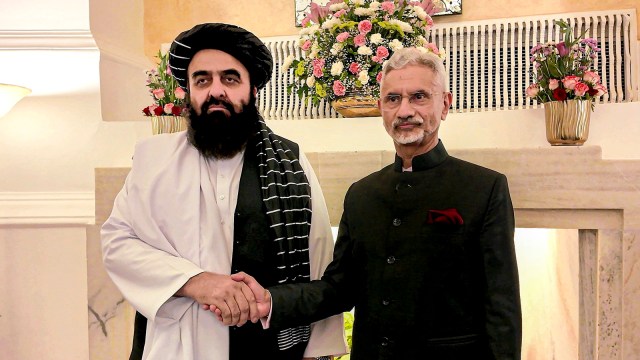
When External Affairs Minister S Jaishankar met Amir Khan Muttaqi, Taliban’s acting foreign minister, on October 9, the gesture carried quiet significance. India’s announcement to upgrade its diplomatic presence in Kabul, after years of a minimal, technical mission, was officially framed as a “people-centric” move aimed at humanitarian cooperation. Yet, beneath the language of humanitarian engagement lies a deeper legal and diplomatic question: Is New Delhi inching towards an implied recognition of the Taliban government?
In international law, recognition is not merely a political declaration but a legal act, as legal scholar Pavle Kilibarda explains in Recognition of States in International Law (2024). Recognition may be express, through formal statements, or implicit, when a state’s conduct leaves no doubt that it accepts another’s legal personality. Acts such as entering into treaties, accrediting diplomats, or establishing embassies are typically considered “conclusive facts” that precondition acceptance of statehood.
By reopening its embassy and holding direct ministerial-level meetings, India walks a fine line. These moves, though couched in pragmatic terms, are “conclusive acts” in international practice, conduct that can, under certain circumstances, amount to implied (tacit) recognition. States have historically used this strategy to balance political caution and legal effect. The German Basic Treaty of 1972 between the Federal Republic of Germany and the German Democratic Republic, for instance, normalised relations without formal recognition but was later held by the German constitutional court to have recognised both as states in substance.
India’s move echoes this logic. New Delhi insists it has not recognised the Taliban regime, maintaining that its outreach is directed at the “Afghan people”. But the very act of engagement, discussing bilateral issues, humanitarian aid, and the operation of Indian development projects, arguably crosses the threshold of mere contact.
Recognition is not binary; international law distinguishes between de facto and de jure recognition. The former is provisional, acknowledging an authority’s effective control without legitimising it politically, while the latter is full and permanent. Historically, de facto recognition allowed states to pragmatically interact with new or unstable regimes, such as the UK’s provisional recognition of Baltic states after World War I or the US recognition of Israel’s “provisional government” in 1948 before extending de jure recognition in 1949.
India’s approach seems to mirror de facto recognition. It acknowledges the Taliban’s factual control over Afghanistan but stops short of endorsing its legitimacy or compliance with international norms, such as women’s rights or counterterrorism commitments. In practice, India treats the Taliban as the authority in Kabul, coordinating on humanitarian aid and infrastructure security, but avoids any formal diplomatic language that would amount to de jure recognition.
This duality allows India to balance its strategic interests (countering Pakistan’s influence and ensuring regional stability) with its normative stance that recognition should follow adherence to international obligations.
Recognition also implicates the question of sovereignty. Under international law, sovereignty attaches to the state, not the government. India’s repeated assertion that it has “historic ties with the Afghan people” rather than the Taliban regime is an invocation of this distinction. It mirrors the reasoning of cases like Namibia (ICJ, 1971), where the Court held that non-recognition of South Africa’s administration should not deprive the people of Namibia of international cooperation.
By focusing on the Afghan populace rather than the Taliban as the sovereign representative, India preserves the fiction of continuity of the Afghan state, despite regime change. This approach allows engagement in areas such as trade, education, and aid, without conceding the Taliban’s legitimacy as the lawful government.
Yet, this carefully constructed narrative may not indefinitely shield India from the legal implications of its conduct. As Kilibarda notes, state practice must be evaluated holistically if engagement becomes institutionalised or long-term (through embassies, treaties, or immunities), it can crystallise into implied recognition despite formal denials.
International precedents caution that intention is not always decisive; conduct can speak louder. Clerget vs Banque commerciale (France) found implied recognition of North Vietnam from France’s decision to extend diplomatic immunities. Similarly, South Africa’s formal relations with Rhodesia were held not to imply recognition only because Pretoria had issued explicit denials, underscoring that express disclaimers remain vital to avoid unintended legal consequences
India’s public statements have so far mirrored this caution. The Ministry of External Affairs’ replies in Parliament reiterate that India’s engagement is “limited to humanitarian and developmental cooperation” and does not signify recognition. This clarity is crucial, for under doctrines like estoppel, a state may later be barred from denying recognition if its conduct has created legitimate expectations in the other party.
India’s engagement with the Taliban today sits at the intersection of law, legitimacy, and necessity. By reopening its Kabul mission and meeting Taliban officials, New Delhi is practicing cautious diplomacy that flirts with implied recognition but remains legally deniable. The delicate balance between de facto engagement and non-recognition reflects not indecision but strategic prudence, a recognition, perhaps, not of the Taliban, but of the enduring sovereignty of the Afghan people.
Whether history will judge this as pragmatic diplomacy or gradual legitimisation depends not only on India’s next moves, such as the formal reopening of the embassy, but also on the Taliban’s ability to behave like a government deserving of recognition in both law and conscience.
The writer teaches at Jindal Global Law School